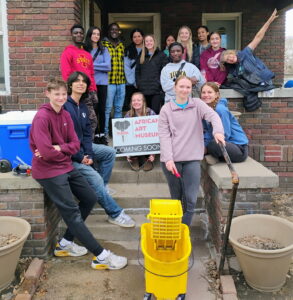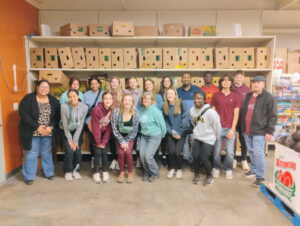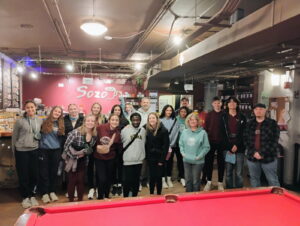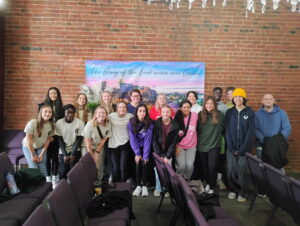Amidst the necessary gathering of documents and details, the next step is often the most dreaded: fundraising. Whether you’re going as part of a team or as an individual, raising funds is typically part of the process and can sometimes feel like pulling teeth and herding cats. But here’s the good news—it doesn’t have to be! We’re here to help, so here’s our simple guide to mission trip fundraising fundamentals:
1. Understand the why
Fundraising can often require a lot of patience and persistence, and it can be a challenging process. This is why it’s important to know why you’re doing it (and sticking with it) in the first place, especially before you begin.
Even if you can finance your trip alone, here’s a couple of reasons why fundraising is still a good idea:
Fundraising not only alleviates the financial burden but also invites your community into the process. When people support your trip financially, they are investing in what God is doing through and within you. They become partners in building the Kingdom of God, lifting you up in prayer and community.
The Church, as depicted in the Bible, is often compared to one body with many parts, where we need one another. Going on a mission trip is another example of how the body can come together to meet each other’s needs and celebrate victories. We are not designed to do life or church alone.
2. Make a Plan
It’s crucial to start fundraising as soon as possible and to have a plan in place. You need to know how much you need to raise, by what dates, how people can donate, and how you intend to raise your needed finances.
Christ For the City’s peer-to-peer fundraising tool makes it easier to share with friends and family and invite them to support you. Our missions team department will help set up a page for your trip.
Here is an example of one of those pages:
Greek Cru Virginia Tech Spring Break Trip (givingfuel.com)
Apart from sending support letters (more on that below), there are many other fundraising options for both teams and individuals.
For example:
FAMILY: Babysitting, Trivia Night.
FOOD: Bake Sale, Cook-off, Coffee Bar, Cookie Dough Sale, Dinner and a Movie, Lemonade Stand, Pancake Breakfast, Taco Bar, Tea Party.
SALES: Business Sponsorship, Discount Cards, Garage Sale, Grant Writing, Matching Gifts, Raffle, T-Shirt Sale, Silent Auction, Spare Change Collection, ‘Rent Out’ yourself or your team (to do yard work, babysitting, moving house, painting, etc.).
SPORTS: Basketball Tournament, Dodgeball Tournament, Video Game Competition, Golf Outing, host a 5K Race, Super Bowl Party, Walk-a-thon.
WORK: Can Collection, Dog Wash, Mow-a-thon, Service Auction, Car Wash.
3. Writing and sending support letters
Writing and sending out support letters is a great first step for meeting your fundraising goals.
Here are some valuable, practical tips and guidelines for doing so effectively:
Step 1: Pray.
Before doing anything else, pray. This whole process is about trusting God to provide. Begin each day declaring, “God loves to provide for me!”
Step 2: Make a list.
Make a list of everyone you know. Think about family, friends, your church community, and other social groups you are a part of (sports, clubs, etc.). Have a financial goal, and make sure you know exactly how much you need to raise.
Step 3: Figure out the wording.
In the section below, there is a sample support/prayer letter template that you are welcome to use as a basis for your own. Try to make your letter as succinct as possible (one page, only double-sided if you have lots of pictures). Make sure you include:
- A greeting
- Details about your current life situation
- Why you are writing to them
- Trip details (where you are going, what you will be doing, when you are going)
- Your hopes and expectations about the trip (your personal vision)
- What your financial needs are (do not be afraid to give suggestions on donation amounts. For example, ‘would you pray about sponsoring me/us $200 to make this trip a reality?)
- How people can give
- Contact details
Communicate that you are going to follow up your letter with either a phone call or a second letter. Then make sure you do this!
Step 4: Make it aesthetically pleasing.
Once you have the wording, you need to make it look good. There are a few simple ways to make this happen:
- Include photos of yourself.
- Use a template. You can get free templates using websites like Google Docs or Canva (www.canva.com)
- Create a visually appealing header.
Leave room to write a personal, handwritten note on the bottom (or the top) of each one.
Step 5: Inclusions.
Include a response card either on the bottom of the letter itself or separately. This is usually a quarter of a sheet of paper (depending on how many details you want to include), giving details of where to send money and the options for giving.
Include a return envelope, with the appropriate donation address to make the process as simple as possible.
Step 6: Be personable.
Be personable! It may be a good idea to call, text, or talk to people before you give them your letter. Let them know that it’s coming, or even ask them if it would be okay if you sent it to them. Hand out as many as you can in person.
SUPPORT LETTER TEMPLATE
Dear NAME,
I hope this letter finds you well!
As you may or may not know, I am currently (DETAILS ABOUT CURRENT LIFE SITUATION- i.e., in my last year of high school, finishing up my college degree, leading the youth group at my church) and I have been given the amazing opportunity to go on a short-term mission trip with (organization) to (location/country name)!
I will be (DETAILS OF MINISTRY OPPORTUNITY AND DATES)
I am writing to ask for your prayers and support. God has given me such excitement for this trip because (DETAILS- i.e., I have a huge heart for working with children. It’s always been my passion to serve Him in this way, and I am inspired by what Jesus said in the Great Commission, etc.).
To go on this mission trip, I need to raise (AMOUNT) by (DATE). Would you prayerfully consider sponsoring me financially? You can donate by (DONATION DETAILS).
Financial support aside, I also humbly ask for your prayers, both in preparation and during my time on the field. Please pray (PRAYER REQUESTS).
Thank you for your friendship and support. I look forward to sharing with you about my time in (LOCATION) when I return home!
Abundant Blessings, (YOUR NAME)
4. Follow Up
Following up is an extremely important part of the fundraising process.
A few weeks after you send your letter, be sure to follow up with people in person or with a phone call, simply asking them if they received it and if they have any questions. Many times people have good intentions to give, but simply forget, and a phone call is a great reminder.
Then, when people do donate to you, be sure to thank them—in person, over the phone, or through the mail before your trip, and after you come back.
It’s a great idea to keep your financial supporters in the loop during your trip and while on the field. Consider purchasing little thank-you gifts or taking a photo with a ‘thank you’ sign to print and send upon your return.
Either way, make appreciation and follow-up a priority before, during, and after your mission trip.
With these simple steps, you will be well on your way to going on your (fully funded) mission trip!
 Jonathan, the Omaha Urban Plunge facilitator, saw a shift happen. “By the end of the trip, they truly became the hands and feet of Jesus—not just to the people they served in Omaha, but to each other,” he said. “I believe they will carry that attitude back to their school and community in Iowa.”
Jonathan, the Omaha Urban Plunge facilitator, saw a shift happen. “By the end of the trip, they truly became the hands and feet of Jesus—not just to the people they served in Omaha, but to each other,” he said. “I believe they will carry that attitude back to their school and community in Iowa.” Adrian saw the power of prayer in a whole new way, understanding that hurt is real, but so is hope—and we’re meant to be part of that hope.
Adrian saw the power of prayer in a whole new way, understanding that hurt is real, but so is hope—and we’re meant to be part of that hope.





 Activity 1: Prayer Walk
Activity 1: Prayer Walk Activity 2: Team-Building Games
Activity 2: Team-Building Games Activity 3: Share Your Testimonies
Activity 3: Share Your Testimonies Activity 4: Serve Together
Activity 4: Serve Together Activity 5: Worship and Reflection
Activity 5: Worship and Reflection Activity 6: Share a Meal Together
Activity 6: Share a Meal Together


